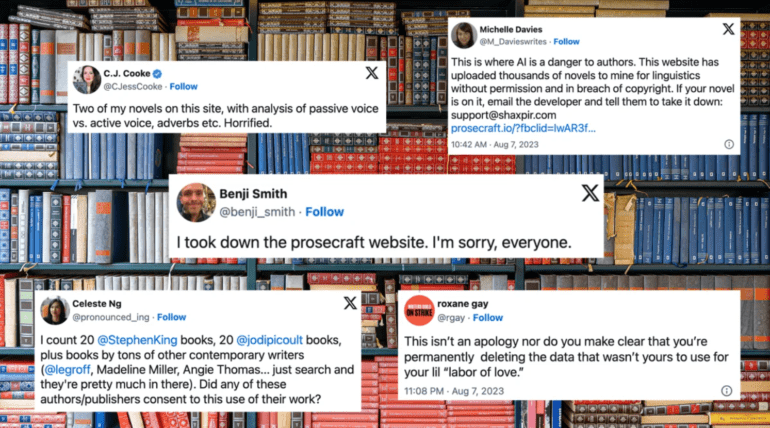TL;DR:
- Prosecraft, an AI-powered platform for literary analysis, has been shut down by its creator due to backlash from authors.
- The tool offered statistical insights like word count, “vividness,” “passive voice,” and adverb frequency for books.
- Data was sourced by crawling the internet, then analyzed using AI algorithms.
- Authors expressed concerns about their work being analyzed without consent.
- Benji Smith, the creator of Prosecraft, also owns Shaxpir, a suite of tools for authors.
- Smith acknowledged authors’ objections and expressed regret in a blog post, leading to the platform’s closure.
Main AI News:
In a striking turn of events, Prosecraft, a groundbreaking AI-powered platform designed for the meticulous analysis of literary works, has been abruptly taken offline by its creator, reverberating through the online realm following an overwhelming backlash from the very authors it intended to serve.
Conceived as a haven for textual scrutiny, Prosecraft empowered users with the ability to access a treasure trove of statistical insights pertaining to individual novels. Ranging from basic parameters such as word count to the intricacies of “vividness,” “passive voice,” and the comprehensive tally of adverbs employed, the platform proffered a comprehensive dissection of written artistry. The genesis of this reservoir of data, as elucidated by its visionary architect, Benji Smith, emanated from the depths of the internet, harvested through an intricate web-crawling mechanism. Subsequently, these multifaceted data streams underwent meticulous scrutiny via advanced artificial intelligence algorithms, forming the bedrock of Prosecraft’s analytical prowess.
However, the swift demise of Prosecraft was announced on a somber Tuesday. An unexpected maelstrom erupted across Twitter/X on the preceding Monday as word spread among authors, fanning the flames of apprehension. Expressions of disquiet resonated deeply as authors questioned the integrity of their creative endeavors, laid bare under the unblinking gaze of AI scrutiny, a process they had not willingly consented to.
In a poignant blog post issued late on that fateful Monday, Benji Smith, a luminary in the realm of author-oriented tools with his establishment of Shaxpir, a kindred suite to Scrivener, declared the cessation of Prosecraft’s operations. The words he penned resonated with a profound understanding of the authors’ collective sentiment, echoing the heartbeats of their unease. “Today the community of authors has spoken out, and I’m listening. I care about you, and I hear your objections,” he acknowledged in a heartfelt response.
Smith’s digital epitaph to Prosecraft encapsulated the essence of his intentions, mired in empathy for storytellers striving to chronicle their narratives. His motivations, driven by a desire to craft something enthralling, utilitarian, and visually splendid, bore no malice toward the literary fraternity. His valedictory words conveyed genuine contrition, resonating with the inherent struggles and aspirations of authors seeking to unfurl their own tales.
In the annals of technology-mediated literary analysis, Prosecraft’s trajectory will be remembered as a profound lesson on the delicate balance between innovation and ethical considerations. Its rise and fall underscore the imperative for alignment between technological marvels and the sensibilities of creative minds, an equilibrium that, when disrupted, can unravel even the most ingenious of endeavors.
Conclusion:
The shutdown of Prosecraft highlights the delicate balance between technological innovation and ethical considerations in the literary market. The incident underscores the importance of obtaining author consent and respecting their creative rights when deploying AI tools for literary analysis. This episode may catalyze greater discussions around the intersection of AI, creativity, and authorship rights in the evolving landscape of digital literary tools.

